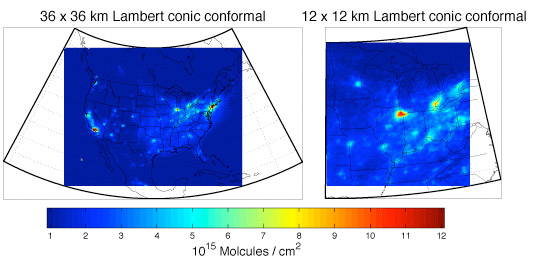WHIPS (the Wisconsin Horizontal Interpolation Program for Satellites) is an open-source program designed to make satellite-derived air quality data more usable. WHIPS interpolates level 2 satellite retrievals onto a user-defined fixed grid, in effect creating custom-gridded level 3 satellite product.

You might be interested in WHIPS if you:
- Run an air quality model and want to validate it against satellite measurements
- Plan to compare satellite data to ground-based measurements
- Need to compare multiple satellites on a common grid
- Want to boost the horizontal resolution of your satellite data by averaging over time
Output is flexible in resolution and projection, and can accommodate both equirectangular and lambert conic conformal projections. Currently, WHIPS can process the following data products:
- TROPOMI NO2
- TROPOMI SO2
- OMI NO2 (NASA and KNMI retrievals)
- OMI HCHO (NASA and QA4ECV retrievals)
- OMI SO2 (NASA retrieval)
- MOPITT CO (NASA retrieval)
- MODIS AOD (NASA retrieval)
Established NASA methodology is used to interpolate and average input data. Output is provided in the netCDF format. As a command-line tool usable in either Linux or Unix environments, it can be easily run from a script for high data throughput.
WHIPS is available free of charge and open source. If you publish research or present results generated with WHIPS, please include the following acknowledgement or an appropriate equivalent:
We wish to thank the University of Wisconsin-Madison for the use and development of the Wisconsin Horizontal Interpolation Program for Satellites (WHIPS). WHIPS was developed by Tracey Holloway, Jacob Oberman, Peidong Wang, Eliot Kim, and other students and staff, with funding from the NASA Air Quality Applied Science Team (AQAST), the NASA Health and Air Quality Applied Sciences Team (HAQAST), and the State of Texas Air Quality Research Program (AQRP).
Downloads
- WHIPS (latest version)
- WHIPS (latest version) User Guide coming soon
- WHIPS v3.0
- WHIPS v3.0 User Guide